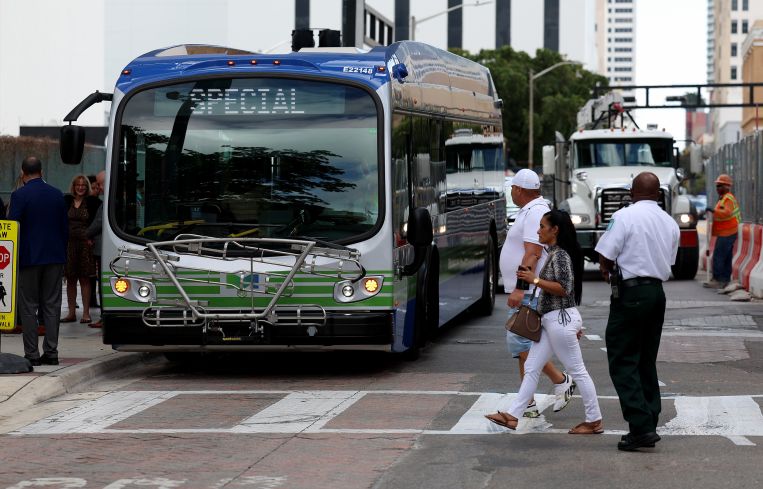E-Bus Rollout Breaks Down Over Reliability Woes, High-Profile Bankruptcy
South Florida and the Philadelphia and New York areas among regions grappling with the fallout from manufacturer Proterra’s problems
By Jeff Ostrowski December 7, 2023 3:40 pm
reprints
Hoping to replace noisy, smelly diesel-powered buses with clean, quiet electric ones, transit systems in Florida’s two largest counties have invested $126 million to buy more than 100 of the shiny new buses.
But the e-bus program is off to a sputtering start, both in South Florida and nationally.
A major manufacturer of e-buses, Proterra of Burlingame, Calif., filed for Chapter 11 bankruptcy reorganization this summer. Now, both Miami-Dade and Broward counties say in court filings that their Proterra buses are plagued with reliability woes.
The Miami-Dade County Department of Transportation and Public Works paid $72 million for 69 of the e-buses, and it offers a poor review of Proterra’s vehicles. “Numerous of these buses have proven unreliable, with nearly half the fleet out of service,” an assistant county attorney wrote in a late November court filing.
In Broward County, home to Fort Lauderdale, the story is similar. Broward County Transit hopes to operate an entirely electric fleet of buses by 2035, and it spent $54 million for 42 electric buses produced by Proterra.
“The buses delivered so far have proven unreliable: Those from the first lot are out of service approximately half the time and break down approximately once every 600 miles, compared to once every 4,500 miles for the county’s aging fleet of diesel buses,” an assistant county attorney wrote.
While both transit agencies publicly touted their introductions of e-buses in recent years, they’ve been less eager to publicize the buses’ unreliable natures. Neither transit agency immediately responded to requests for comment.
Miami-Dade and Broward are far from alone, either in buying e-buses or in griping about the poor quality of Proterra’s product. Transit agencies across the country have been adding e-buses, fueled in part by the Biden administration’s 2021 infrastructure law that earmarked $5.5 billion for transit agencies that buy electric buses.
The appeal is clear: Unlike traditional diesel-powered buses, the electric vehicles emit no clouds of black smoke at street level. There’s no roar as the buses accelerate from stoplights or bus stops.
But the downsides are coming into focus, too. In Philadelphia, an early adopter of e-buses, the Proterra bankruptcy means the Southeastern Pennsylvania Transportation Authority (SEPTA) could lose $24 million it spent on flawed Proterra e-buses. Philly debuted the new buses during the Democratic National Convention in 2016.
“Unfortunately, since receiving the electric buses from Proterra, SEPTA has found them to be plagued with problems that have kept them out of service, thus rendering them useless to SEPTA and its riders,” an attorney representing SEPTA wrote in a filing with the bankruptcy court.
SEPTA pulled 25 buses from service in early 2020. SEPTA found cracked frames, weak axles and other structural problems. In 2022, a Proterra bus burst into flames at a South Philly depot, the Philadelphia Inquirer reported.
SEPTA and Proterra had been haggling over repairs to get the buses back in service, but those discussions ended with the bankruptcy filing, the Inquirer reported.
Proterra’s growing pains came partly because of the quirks of the e-bus business model, and partly from the spike in inflation that peaked in 2022.
Proterra doesn’t recognize revenue until it delivers buses. Transit agencies typically sign contracts 12 to 18 months before buses are built, Proterra said in its bankruptcy filing. If costs soar in the meantime, Proterra’s margins suffer.
“Contracts signed in 2021 proved to be priced below where the manufacturing costs were ultimately realized in 2022,” the company said.
It’s unclear how transit agencies will deal with their maintenance issues after Proterra’s reorganization. The U.S. Bankruptcy Court in Delaware is weighing the sale of Proterra’s bus business to Phoenix Motor Inc., but a number of transit agencies — including Broward County Transit and the Port Authority of New York and New Jersey — have objected to that transaction.
The City of Tallahassee, which bought Proterra buses to serve downtown and Florida State University’s campus, said Phoenix Motor is financially unproven.
“Phoenix has not demonstrated that it has the financial resources available to perform under assigned contracts and leases,” the city wrote in a bankruptcy filing.
Jeff Ostrowski can be reached at jostrowski@commercialobserver.com.



